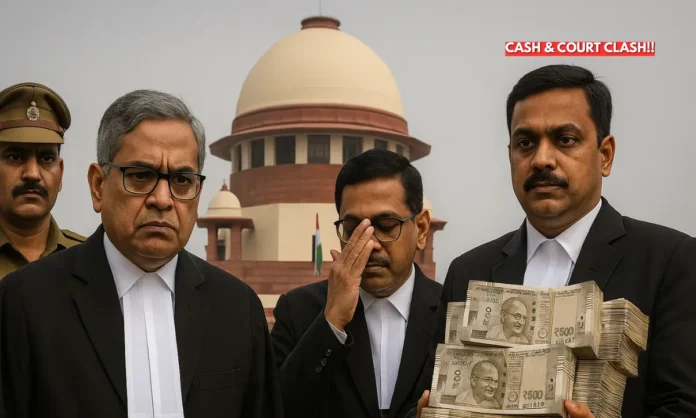Summary
- CJI BR Gavai recuses himself from hearing the case due to prior involvement.
- Justice Varma challenges the inquiry panel’s findings and impending impeachment.
- Cash recovery at his Delhi residence sparked allegations of judicial corruption.
Constitutional Test for Judicial Accountability
The Supreme Court of India is preparing to constitute a special bench to hear Justice Yashwant Varma’s challenge to the report of a three-judge panel that recommended his impeachment following the recovery of a massive cash stash at his official Delhi residence. Chief Justice of India (CJI) BR Gavai, while addressing the matter in court, recused himself, citing prior discussions with former CJI Sanjiv Khanna, who had advised Parliament to initiate impeachment proceedings against the judge.
Senior Advocate Kapil Sibal, representing Justice Varma, stressed the urgency of the hearing, pointing out “serious constitutional questions” surrounding the case. A legal heavyweight panel, including Mukul Rohatgi, Rakesh Dwivedi, and Sidharth Luthra, is advocating on behalf of Justice Varma. The case’s outcome is likely to shape the discourse on judicial integrity and accountability.
The #SupremeCourt is set to constitute a bench to hear Justice Yashwant Varma’s petition challenging the in-house inquiry committee’s report that indicted him in the cash-at-residence case. Chief Justice of India B.R. Gavai has recused himself from hearing the plea. pic.twitter.com/qLtWpl4bvS
— DD News (@DDNewslive) July 23, 2025
The Cash Recovery That Sparked Controversy
- March 14: A fire incident at Justice Varma’s official residence in Lutyens’ Delhi led to the discovery of huge amounts of cash, including burnt currency notes stored in plastic bags.
- The discovery triggered a nationwide uproar and raised suspicions of corruption within the judiciary.
- Justice Varma has categorically denied any involvement with the recovered cash, calling it a “malicious conspiracy.”
Following the incident, a Supreme Court-appointed inquiry panel found him guilty of misconduct. Former CJI Sanjiv Khanna’s recommendation for impeachment was subsequently forwarded to Parliament. The controversy intensified after Justice Varma was repatriated to the Allahabad High Court, where his judicial functions have since been curtailed.
Political Fallout and Legal Maneuvers
- Opposition leaders have seized on the case, highlighting it as evidence of systemic flaws in judicial oversight.
- Parliament is set to debate the motion for Justice Varma’s impeachment during the ongoing Monsoon Session, which begins this week.
- Legal experts note that if the Supreme Court overturns the panel’s findings, it could stall or derail the impeachment process.
The case has also drawn attention to the delicate balance between judicial independence and the mechanisms available for disciplining judges.
What Lies Ahead?
The Supreme Court’s special bench will be pivotal in determining whether Justice Varma’s claims of conspiracy have merit or whether the panel’s findings of misconduct will stand. The case also raises broader questions about transparency, oversight, and trust in India’s judicial system.
With Parliament preparing to debate Justice Varma’s impeachment, the outcome of this legal battle could have far-reaching implications for both the judiciary and political establishment.


